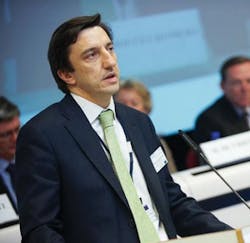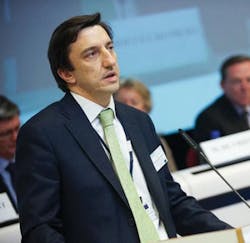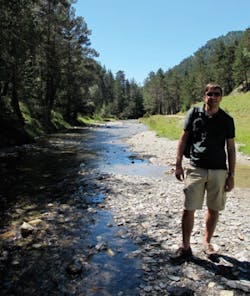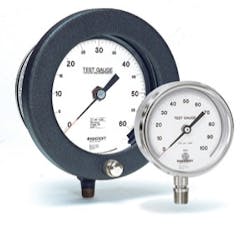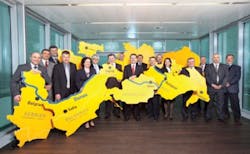Cleaning Up Europe's Troubled Waters
A decade ago saw the introduction of the European Water Framework Directive, setting out challenging targets for member states up until 2027. Beggared by global economic meltdown, how have countries responded to the deadlines? Tom Freyberg talks to Dr Jorge Rodriguez from the European Commision to find out more.
The Commission is now undertaking the assessment of all the river basin management plans received
The turn of the Millennium in 2000 didn't just signal a significant moment for the world, it also signalled the start of a very important year for water. It was in December 2000 that the Water Framework Directive (WFD) came into force. Surprisingly, this was mainly as a result of increasing demand by environmental groups and citizens for cleaner rivers, lakes, coastal waters and groundwater.
Climate change and economic uncertainty may well be major concerns for people today, but 10 years ago it was - and continues to be - water quality and pollution.
For example, when asked to list the five main environmental issues that Europeans are worried about, average results for the EU25 showed that nearly half (47%) of respondents quoted "water pollution". This figure reached an astonishing 71% in certain individual countries.
The public had clearly spoken and as a result, water had been catapulted to the top of the European Commission (EC) agenda.
The timetable for the original implementation of the WFD included 2010 for the introduction of pricing policies; 2012 to make operational programmes of measures; 2015 to meet environmental objectives and 2027 as the final deadline for meeting objectives.
With some of the initial deadlines now passed, it raises the question of how member states have progressed so far? While a high number of countries have adopted and submitted data on River Basin Management Plans (RBMPs), including the UK and France, several Member States failed to meet initial deadlines. They are now being urged by the EC to comply with the legislation and submit plans. Such delays could mean these States are referred to the European Court of Justice.
Water and Wastewater International (WWi) caught up with Dr Jorge Rodriguez Romero (JRR), WFD team co-ordinator at the European Commission, to find out more.
WWi: The deadline for publishing River Basin management plans (Dec. 22 2009) and the deadline for reporting plans to the European Commission (March. 22 2010) have expired. I see the EC is now urging seven member states, including Belgium and Portugal, to submit plans after the deadline. Why do you think these states did not meet the deadline and what are the consequences if there are any further delays?
JRR: The Commission believes the implementation of the Directive is a priority and therefore maintains infringements against all Member States that have not yet published their plans. This includes 10 Member States at the moment: five Member States have concluded the public consultations and therefore are expected to publish their plans soon (Poland, Romania, Slovenia, Malta and Cyprus). Another five have not yet started consultation or this is on-going at the moment and therefore delays on adoption are expected to be longer (Portugal, Spain, Greece, Denmark and part of Belgium).
Reasons for delays differ depending on the country but in most cases they are administrative or political. The Directive includes a long period of nine years for the preparation of the plans. The very fact that most Member States have published their plans on time or shortly after the deadline shows that it is possible. We are concerned that long delays will make it impossible to implement required measures by 2012, as stated in the Directive. These could put the achievement of the objectives - to restore water bodies to good status by 2015 - at risk.
WWi: How ambitious are the RBMPs submitted from other Member States so far?
JRR: Across the EU the Directive's common objectives are to achieve "good" status by 2015 and to avoid deterioration of water bodies. The Commission is now undertaking the assessment of all the river basin management plans received (more than 100 for the moment). The documents are written in national languages and in most cases amount to hundreds of pages, even thousands with the annexes. It is a process that will result in the publication of the Commission implementation report in 2012.
In this sense, it would be premature to extract conclusions on the level of ambition. We have to take into account that the starting points are very different. Large countries with low population density have a relatively high proportion of water bodies, which are currently in good status. In other countries there are hardly any water bodies in good status due to very high pressures on resources. The efforts need to be proportionate to the problems and some Member States will have to do more than others.
WWi: You mentioned the implementation report set for publication in 2012. What is the scope of this work and how is it progressing?
JRR: We are assessing all main aspects of water management contained in the plans. We are not looking only at the legal requirements of the Water Framework Directive but going beyond to make an interim assessment of policy effectiveness. The assessment cannot constitute a full review of the policy cycle because the Directive is supposed to deliver on its objectives only in 2015. The work is progressing well and we are confident the outcome will be useful to improve implementation.
Dr Romero says a healthy aquatic environment will benefit everyone across Europe
WWi: Public participation has been cited as a key factor in successfully implementing RBMPs. How have member states faired in this area to date?
JRR: Public participation is one of the most important considerations of the Directive. We have encouraged Member States to see public participation processes as an opportunity to improve the quality of water management and to increase acceptance and legitimacy in decision making. Sustainable water management needs real engagement by sectors, NGOs and ultimately support from the public on the use of substantial public funds to keep our waters clean and our ecosystems healthy. For example, 90% of the river basins declare that agriculture is a significant pressure that prevents water bodies from achieving the Water Framework Directive objectives. If we want to tackle this and restore water bodies to a better situation, we have to work with the sector to find solutions.
WWi: You mentioned at the recent EWA conference in Brussels that "substantial budgets" are being allocated in countries to help meet WFD requirements. Firstly, can you provide examples of such budgets and secondly, how does the EC expect countries currently experiencing severe economic difficulties to fund the implementation of such legislation?
JRR: Together with the plans, Members States have also published financial figures. These include 20 billion euros in France until 2015, nine billions in Germany and 2.3 billion euros in the Netherlands. These figures should not be directly compared as they have been calculated on the basis of different methodologies. However, they are all substantial budgets. It's important to not only talk about costs, but also about benefits. A healthy aquatic environment will deliver many services that will benefit all of us.
Economic crisis is indeed a factor that is making things more difficult in many countries. Public budgets are under severe pressure. It is however difficult to estimate the impact. Nevertheless, EU regional funds are still available for investments and measures that are essential for the implementation of EU water legislation, such as wastewater treatment. Other funds such as rural development can also play a very important role for water protection.
WWi: The EU's "Blueprint for water policy" comprising River Basin Management Plans, Climate Change adaptation policy review and review of the Water Scarcity and Droughts strategy is set to be a milestone in European water policy. Can you tell me more about the progress of the Blueprint Impact Assessment?
JRR: The 2012 Blueprint to Safeguard Europe's Water Resources was announced by Commissioner Potoc˘ nik and will bring together the implementation report of the Water Framework Directive and a review of the policy on water scarcity and droughts. It will also include an assessment of the vulnerability of Europe's water resources to climate change and other man-made pressures.
We have launched a number of studies and working strands in close collaboration with other Commission services (Joint Research Centre, Eurostat, Research) and the European Environment Agency. We are looking at how the situation of Europe's waters will look like in the long term. We are also looking at things that are working well and things where we need to do more.
We intend to build the preparations of the Blueprint with a wide stakeholder consultation, which will be culminated with the Third European Water Conference in spring 2012. We have recently presented our ideas to the EU Water Directors at their meeting in Spa under the Belgian Presidency and we are looking forward to working closely with Member States in the preparations. We expect 2012 to be an important year for water.
Team work: Ministers from Danube River Basin Countries came together and agreed to help improve environmental conditions of the river
WWi: Is there a danger that industries such as renewable energy get prioritized ahead of water when it comes to political and financial attention in Europe?
JRR: I think there is a danger that hydropower is considered good per se because it contributes to the EU's renewable energy target, which is part of the EU's strategy to fight against climate change. This is a legitimate objective, but we must not forget that water protection is legitimate. Hydropower has significant impacts on the water environment. Putting just one objective ahead of the other without further consideration is short-sighted. In 2006 we worked with Member States and the sector to develop policy recommendations to better integrate hydropower development with the Water Framework Directive objectives. These recommendations are still valid.
We think a strategic approach is needed for the development of new hydropower that preserves important free flowing rivers through the establishment of no-go areas. The same energy production in one river stretch or another can have substantially different impacts. Small plants can also have a major impact on the aquatic environment. The river basin approach requires going beyond local interests to a more strategic approach that considers all aspects of the development. I am convinced such a strategic approach would be good for water and good for hydropower as it will reduce conflict.
WWi: And finally, how confident are you about the Directive's aims that state water bodies must achieve a "good" qualitative and quantitative status by 2015?
JRR: The Water Framework Directive objectives are quite challenging. Despite the difficult times which we are living in, with the fierce economic crisis and pressure on budgets, I am confident that there will be an important progress towards achieving good status of EU waters. The question is not whether we can afford it but can we afford not to do it? For example, what is the cost of no action? Water is already under severe pressure and this will only increase with climate change. We cannot afford to lose the services and benefits that a healthy aquatic ecosystem provides. We need clean water in sufficient quantities for our living and for economic activities. In order to keep that, we need a determined action to protect water resources.
We know not all will be achieved by 2015, but the Water Framework Directive provides a strong framework for improvement. The river basin management plans should provide a comprehensive picture of the state of our waters and the measures that need to be taken. We know much more now about our waters than before thanks to the WFD.
A significant reduction in pollution from industrial, urban and agricultural sources has been achieved thanks to years of implementation of EU water legislation. However, we now know that if we want to achieve a healthy environment we need to do more and our policies have to be better integrated.
- More information on the state of Europe's water can be found at the European Environment Agency's website: www.eea.europa.eu
More Water & WasteWater International Current Issue Articles
More Water & WasteWater International Archives Issue Articles
